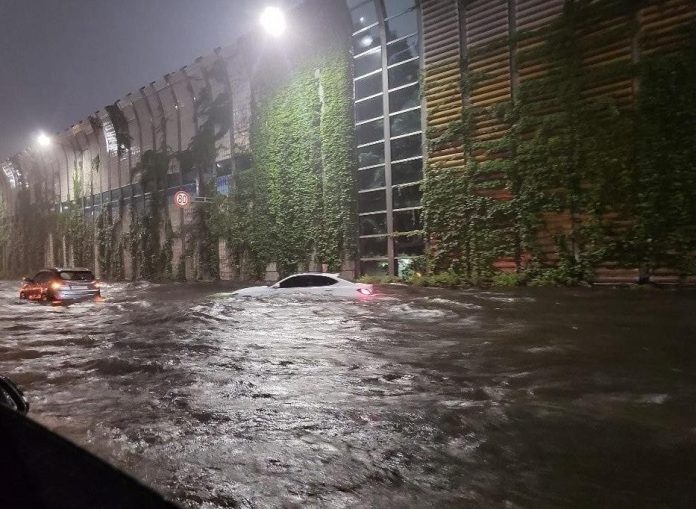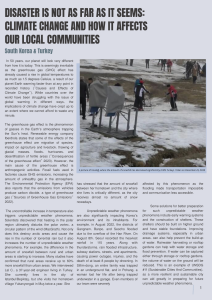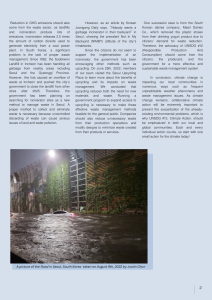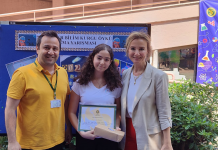Levent Yerleşkemizden lise 9 ve 10 IB sınıfı öğrencilerimiz, 2022 – 2023 öğretim yılında çevre gönüllüsü olarak Young Reporters for The Environment (Çevrenin Genç Sözcüleri) Programı’na katıldı. Bu program kapsamında “Disaster as not as far as it seems: Climate Change and How It Affects Our Local Communities (Felaket Düşünüldüğü Kadar Uzak Değil: İklim Değişikliği ve Bu Değişikliğin Yerel Topluluklar Üzerine Etkileri)” adlı bir makale yazdılar.
Öncelikle öğrencilerimiz Aslı Beyzadeoğlu (9 IB I), İdil Melis Güvendir (9 IB I), Alya Konca (9 IB H), Ela Kurt (9 IB I), Alya Şirin Yazıcılar (9 IB H), Maya Yalçınkaya (9 IB I) ve Oya Ok’un (10 IB FM G), Kimya öğretmenimiz Seval Dikbaş danışmanlığında ayda iki kez Güney Kore’den Chadwick International Lisesi öğrencileriyle bir araya geldi. Yaptıkları araştırma, röportaj, fotoğraf ürünlerini onlarla paylaşarak işbirliği içinde çalıştılar. Ardından aşağıda yer alan makaleyi yazdılar.
Çevrenin Genç Sözcüleri Programı, gençleri çevre sorun ve konularını anlamaya yönelten ve onları bilinçlendirmek amacıyla çevre eğitimi yapan uluslararası bir program. Bu amaçla, 44 ülkeden okulların katıldığı ve çevreyle ilgili haberlerin yer aldığı bir okul ağı oluşturuldu. Eğitim aracı olarak, gençlerin ilgisini çeken, çevre gazeteciliği yöntemi benimsenmiş olup, öğrencilerin bulundukları okul yöresinde çevre sorun ve konularını araştırıp inceleyerek haber nitelikli makale, fotoğraf ve kısa video kaydı üretmeleri teşvik ediliyor. Böylece, gençlere seslerini duyurabilecekleri bir ortam sunularak çevresel haksızlıkları dillendirmeleri, çevresel sorunların yetkililer tarafından düzeltilmesini sağlamak için kamuoyu oluşturmakla birlikte, onlara bazı şeyleri değiştirebilecekleri duygusunu yaşatarak çevreye duyarlı vatandaşlar olarak yetişmeleri hedefleniyor.
Yazdıkları bu makale 25 Nisan Salı günü Çevrenin Genç Sözcüleri Ulusal Koordinasyon Merkezi’ne gönderilecek. Uluslararası yarışma sonuçları ise Haziran sonunda toplanacak uluslararası jüri tarafından belirlenecek. Kazanan okulların çalışmaları Temmuz ayı içinde açıklanacak.
Disaster Is Not As Far As It Seems: Climate Change And How it Affects Our Local Communities
In 50 years, our planet will look very different from how it is today. This is seemingly inevitable as the greenhouse gas (GHG) effect has already caused a rise in global temperatures to as much as 1.5 degrees Celsius, a result of our planet Earth warming faster than at any point in recorded history (“Causes and Effects of Climate Change”). While countries over the world have been struggling with the issue of global warming in different ways, the implications of climate change have crept up to an extent where we cannot afford to waste any minute.
The greenhouse gas effect is the phenomenon of gasses in the Earth’s atmosphere trapping the Sun’s heat. Renewable energy company Iberdrola states that some of the effects of the
greenhouse effect are migration of species, impact on agriculture and livestock, thawing of
glacial masses, floods, hurricanes, and desertification of fertile areas (“Consequences of the
greenhouse effect” 2023). However, the main cause of the greenhouse effect is anthropogenic activities. Fossil fuels used in factories cause GHG emissions, increasing the amount of unhealthy gas in the atmosphere. The Environmental Protection Agency (EPA) also reports that the emissions from vehicles produce carbon dioxide, a type of greenhouse gas (“Sources of Greenhouse Gas Emissions” 2022).
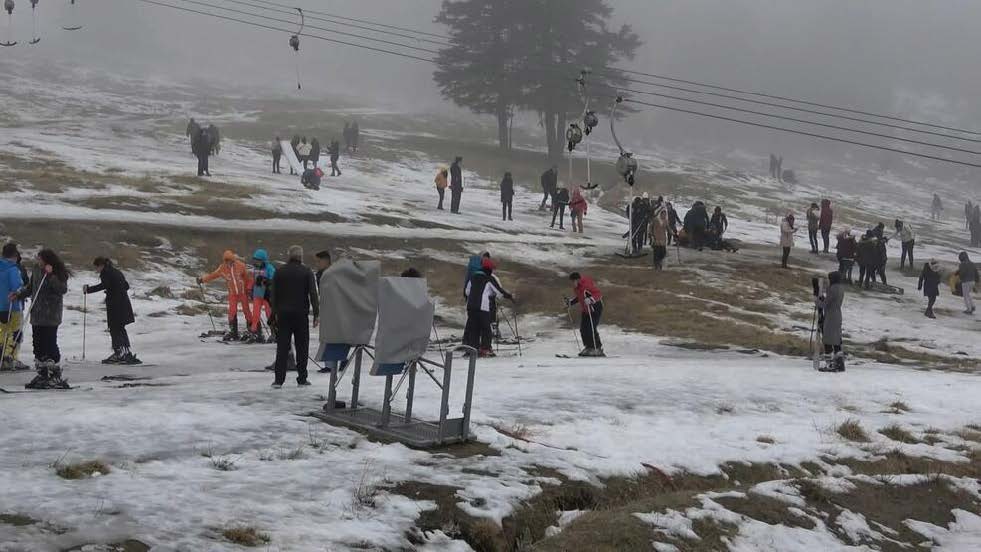
The uncontrollable increase in temperature also triggers unpredictable weather phenomena. Scientists discovered that heating in the polar region ultimately disturbs the polar vortex, a circular pattern of the wind (MacGrath). Not only does this destroy arctic areas and cause the rise in the number of torrential rain but it also increases the number of unpredictable weather phenomena. For example, the difference in the amount of snowfall between rural and urban areas is starting to increase. Many studies have confirmed that rural areas receive up to 60% more snowfall than urban areas. We interviewed Lal C., a 37-year-old engineer living in Turkey. She currently lives in the city of Istanbul/Beşiktaş, but she visits her hometown village Yukarıyongalı in Muş twice a year. She has stressed that the amount of snowfall between her hometown and the city where she lives is critically different, as the city receives almost no amount of snow nowadays.
Unpredictable weather phenomena are also significantly impacting Korea’s environment and its inhabitants. For example, in August 2022, the districts of Gangnam, Banpo, and Seocho flooded due to the overflow of the Han River. On August 8th, Seoul recorded the heaviest rainfall in 115 years. Along with thunderstorms, rain flooded infrastructure, subway stations, streets, and apartments, causing power outages, injuries, and the death of at least 8 people by drowning. In Sillim-dong, an entire family was trapped in an underground flat, and in Pohang, a woman lost her life after being trapped underwater in a garage. Even members of our team were severely affected by this phenomenon as the flooding made transportation impossible and communication less accessible.
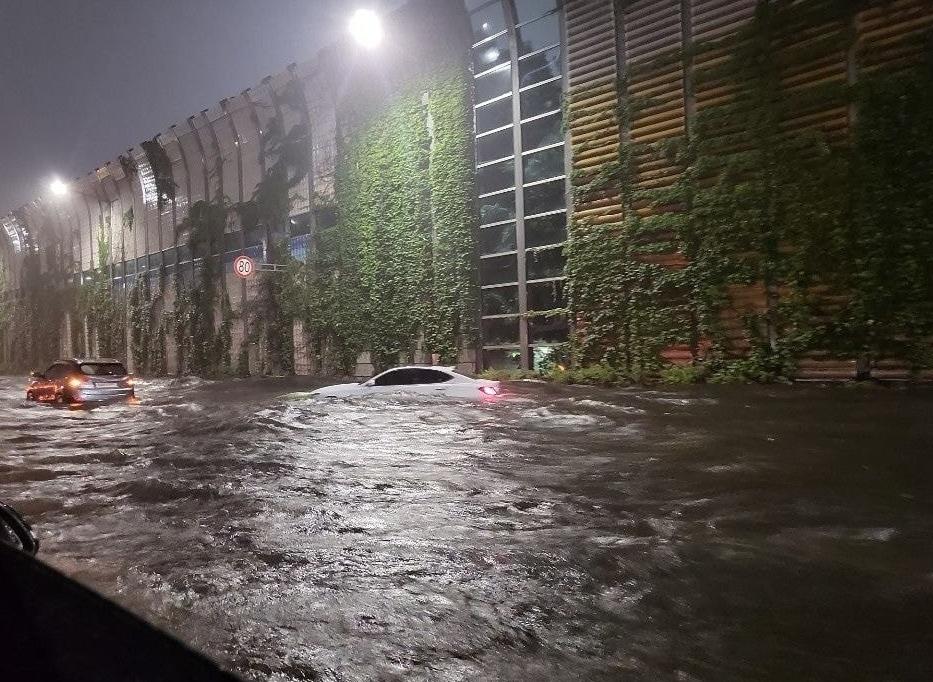
Some solutions for better preparation for such unpredictable weather phenomena include early warning systems and the construction of shelters. These shelters should be built on higher ground and have stable foundations. Improving drainage systems, especially in urban areas, can also help prevent the build-up of water. Rainwater harvesting or rooftop gardens can help with water storage and flood prevention. If water can be captured either through storage or rooftop gardens, the volume of water on the ground will be reduced. This is an example of UNSDG #11 (Sustainable Cities And Communities), as a more resilient and sustainable city can aid greatly in preparing for future unpredictable weather phenomena.
Reduction in GHG emissions should also come from the waste sector, as landfills and
incineration produce lots of emissions; incineration releases 2.5 times the amount of carbon dioxide used to generate electricity from a coal power plant. In South Korea, a significant problem is the lack of proper waste management. Since 1992, the Sudokwon Landfill in Incheon has been handling all garbage from nearby areas including Seoul and the Gyeonggi Province. However, this has caused an overflow of waste at Incheon and pushed the city’s government to close the landfill from other cities after 2025. Therefore, the government has been planning on searching for incinerator sites as a new method to manage waste in Seoul. A proper method to collect and eliminate waste is necessary because uncontrolled discarding of waste can cause serious issues of land and water pollution. However, as an article by Korean Joongang Daily says, “Nobody wants a garbage incinerator in their backyard” in Seoul, showing the prevalent Not In My Backyard (NIMBY) attitude of the city’s inhabitants.
Since the citizens do not seem to support the implementation of an incinerator, the government has been encouraging other methods such as upcycling. On June 25th, 2022, members of our team visited the Seoul Upcycling Plaza to learn more about the benefits of upcycling and its impacts on waste management. We concluded that upcycling reduces both the need for new materials and waste. Running a government program to expand access to upcycling is necessary to make these effective waste management methods feasible for the general public. Companies should also reduce unnecessary waste from their production operations and modify designs to minimize waste created from their products or services. One successful case is from the South Korean dairies company, Maeil Dairies Co., which removed the plastic straws from their drinking yogurt product due to citizens’ demand for waste reduction. Therefore, the advocacy of UNSDG #12 (Responsible Production And Consumption) should come from the citizens, the producers, and the government for a more effective and sustainable waste management system.
In conclusion, climate change is impacting our local communities in numerous ways such as
frequent unpredictable weather phenomena and waste management issues. As climate change worsens, collaborative climate action will be extremely important to prevent the exacerbation of the already-existing environmental problems, which is why UNSDG #13, Climate Action, should be emphasized in both our local and global communities. Each and every individual action counts, so start with one small action for the climate today!
Works Cited
“Climate Change Indicators: Greenhouse Gases | US EPA.” Environmental Protection Agency, 1 August 2022, https://www.epa.gov/climate-indicators/greenhouse-gases. Accessed 9 February 2023.
“Don’t Talk Trash About South Korea’s Waste Management System.” Vincent Au,
https://vinceau.medium.com/dont-talk-trash-about-south-korea-s-waste-management-system-7a11e15ff0e1. Accessed 17 March 2023.
“Greenhouse Gas Emissions from Agriculture in Europe.” Www.eea.europa.eu,
www.eea.europa.eu/ims/greenhouse-gas-emissions-from-agriculture.
Gibson, Jenna, and Catherine Putz. “Seoul’s Trash Crisis – The Diplomat.” The Diplomat,
https://thediplomat.com/2021/05/seouls-trash-crisis/. Accessed 17 March 2023.
Hickman, Leslie. “The Road to a Plastic-Free Society: Korea’s Fight Against Plastic Waste.” Asia Society, 27 April 2022, https://asiasociety.org/korea/road-plastic-free-society-koreas-fight-against-plastic-waste. Accessed 17 March 2023.
“Incheon trashes Greater Seoul’s landfill hopes.” The Korea Herald, 20 July 2021,
https://www.koreaherald.com/view.php?ud=20210720000790. Accessed 17 March 2023.
Jay, Allyson. “Why Is Weather so Incredibly Unpredictable?” The Spectrum, 7 Dec. 2020,
www.blakespectrum.org/blog/2020/12/07/why-is-weather-so-incredibly-unpredictable/.
McGrath, Matt. “Climate Change: Arctic Warming Linked to Colder Winters.” BBC News, 2 Sept. 2021, www.bbc.com/news/science-environment-58425526.
Nunez, Christina. “Carbon Dioxide in the Atmosphere Is at a Record High. Here’s What You Need to Know.” National Geographic, National Geographic, 13 May 2019,
www.nationalgeographic.com/environment/article/greenhouse-gases.
“Preliminary US Greenhouse Gas Emissions Estimates for 2022.” Rhodium Group, 10 January 2023, https://rhg.com/research/us-greenhouse-gas-emissions-2022/. Accessed 9 February 2023.
“Republic of Korea.” G20 Climate Risk Atlas, https://www.g20climaterisks.org/republic-of-korea/. Accessed 17 March 2023.
Roh, Joori. “Record rain leaves at least 8 dead in South Korean capital.” Reuters, 9 August 2022, https://www.reuters.com/world/middle-east/record-rain-leaves-least-7-dead-skorean-capital-2022-08-08/. Accessed 17 March 2023.
Se, Kim. “’Incheon airport, Haeundae Beach will be underwater by 2030.’” The Korea Times, 13 August 2020, http://www.koreatimes.co.kr/www/nation/2021/03/371_294350.html. Accessed 17 March 2023.
Stanford University. “Why Warming Makes Weather Less Predictable.” Stanford News, 14 Dec. 2021, news.stanford.edu/2021/12/14/warming-makes-weather-less-predictable/.
Se, Kim. “’Incheon airport, Haeundae Beach will be underwater by 2030.’” The Korea Times, 13 August 2020, http://www.koreatimes.co.kr/www/nation/2021/03/371_294350.html. Accessed 17 March 2023.
SU-MIN, LEE. “Nobody wants a garbage incinerator in their back yard.” Korea JoongAng Daily, 21 July 2022, https://koreajoongangdaily.joins.com/2022/07/21/national/socialAffairs/Korea-landfill-incinerator/2022072 1191719862.html. Accessed 17 March 2023.
“The Consequences of the Greenhouse Effect: From Desertification to Floods.” Iberdrola, 2022, www.iberdrola.com/sustainability/greenhouse-effects-consequences-and-impacts.
United Nations. “Causes and Effects of Climate Change.” United Nations, United Nations, 2022, www.un.org/en/climatechange/science/causes-effects-climate-change.
US EPA, OAR. “Sources of Greenhouse Gas Emissions.” US EPA, 29 Dec. 2015,
www.epa.gov/ghgemissions/sources-greenhouse-gas-emissions#t1fn2.
“What Are Greenhouse Gases? | National Grid Group.” Www.nationalgrid.com,
www.nationalgrid.com/stories/energy-explained/what-are-greenhouse-gases#:~:text=Greenhouse%20gases %20. Accessed 8 Feb. 2023.
“Why Is the Weather so Unpredictable? | the Children’s Museum of Indianapolis.” Www.childrensmuseum.org, www.childrensmuseum.org/blog/why-weather-so-unpredictable.
YouTube, https://www.koreatimes.co.kr/www/nation/2023/03/281_295669.html. Accessed 17 March 2023. “갑자기 너무 추워진 날씨.. 주기적으로 올 급격한 추위 유의해야.” BBC, 30 November 2022, https://www.bbc.com/korean/news-63805091. Accessed 17 March 2023.

